The word uvea originated from ‘uva’ the Latin word for grape. Uvea is the middle layer of the eye behind the external layer sclera (the white of the eye) and in front of retina, the transparent layer at the back of the eye.
The department of Uveitis and ocular immunology at Narayana Nethralaya, armed with highly qualified consultants, a well-equipped clinical laboratory and state of the art ophthalmic diagnostic equipment deals with the whole battery of ocular inflammations including autoimmune diseases and infections in both adults and children. We co-ordinate with the other subspecialities of ophthalmology and internal medicine efficiently to get the optimal treatment outcomes for patients with complex Uveitic disorders.
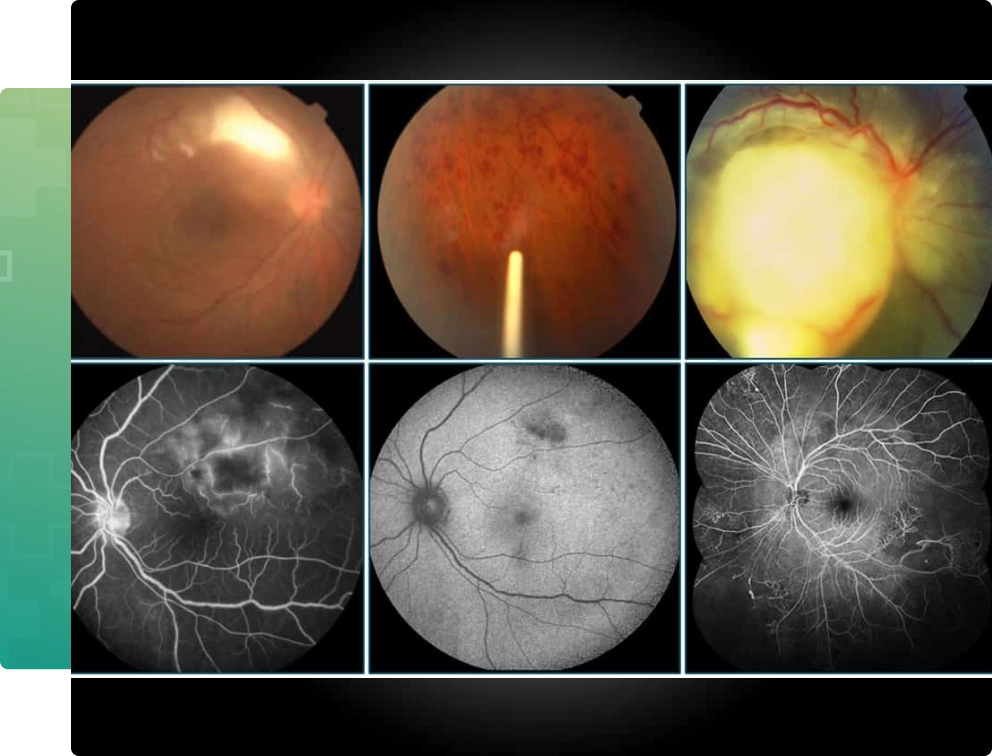
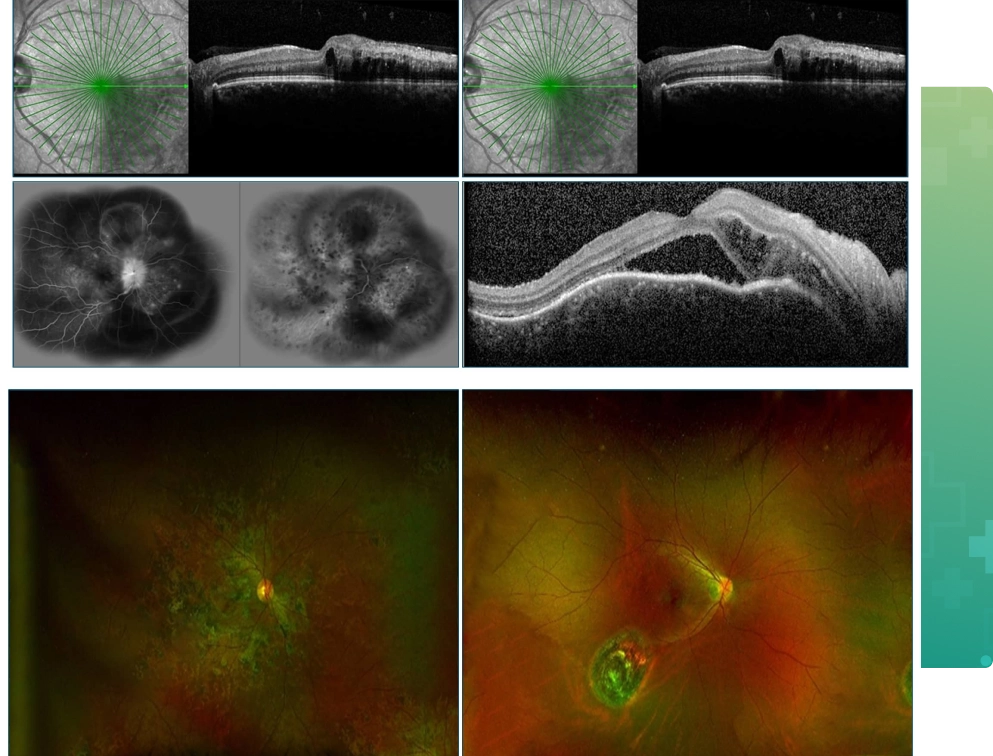
The Uveitis & Ocular Immunology Service provides a multidisciplinary approach to the treatment of ocular inflammatory disease and other infectious disorders. Experts here deal with diagnosis and management of complex infectious and autoimmune diseases of the eye as well as eye diseases associated with various other systemic medical disorders. The diagnostics are backed by a well-equipped laboratory, pathology and molecular diagnostic services, and the consultants are conversant with appropriate intervention techniques. In addition, we have the experience with the latest treatments including the use of immunosuppressive and immunomodulation for autoimmune eye diseases.
We were the first in the world to have reported “Ocular Manifestations associated with Chikungunya fever” especially Chikungunya Retinitis
Inflammation of any of these three parts is called uveitis.
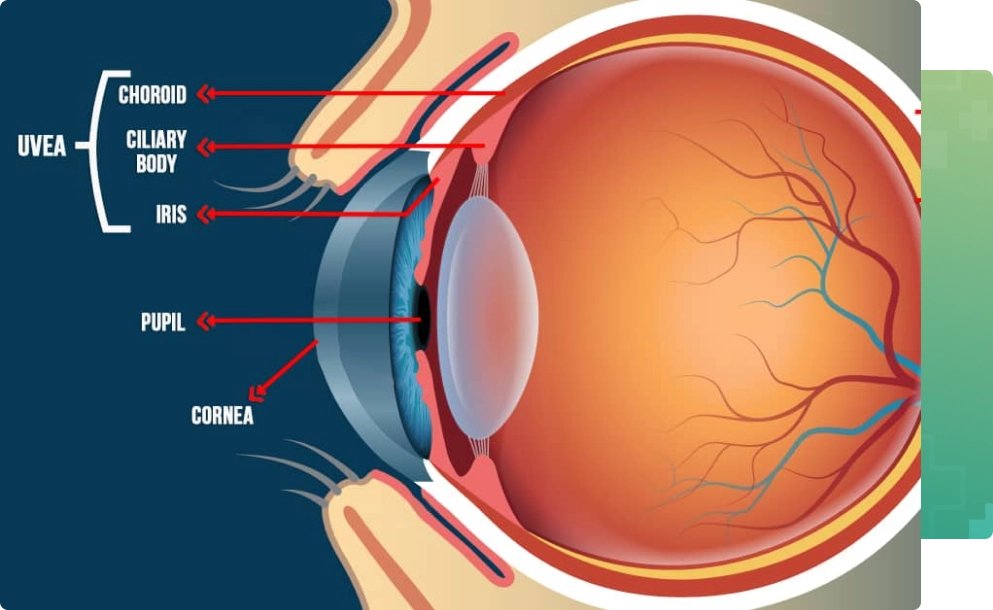
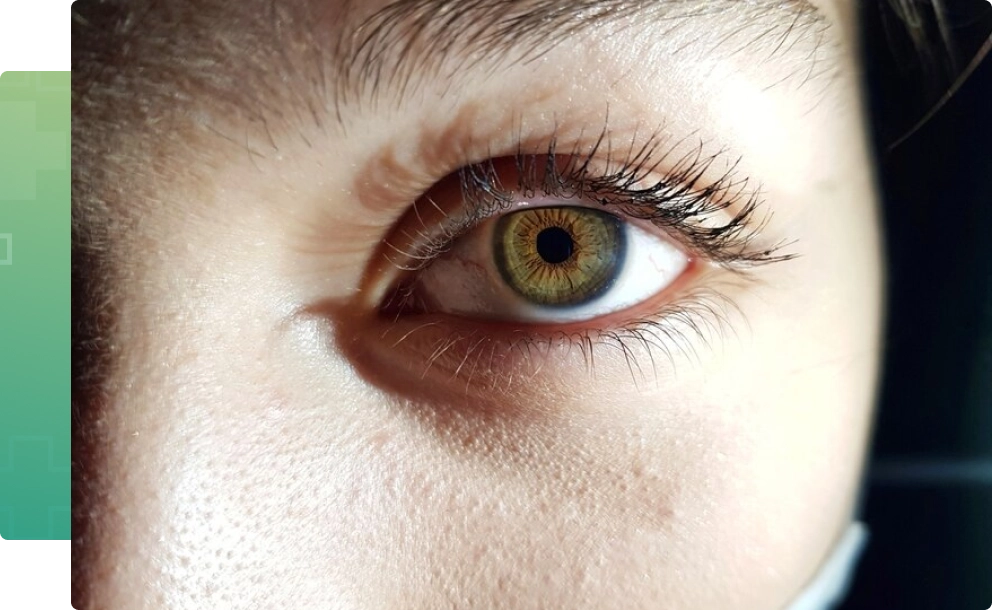
According to standardisation of uveitis nomenclature (SUN), uveitis is classified into
In addition to uveitis, adjacent structures may also be affected; for example, retinitis may be caused when retina is affected; similarly, uveitis may also be associated with optic neuritis (optic nerve), keratitis (cornea) and scleritis (sclera).
Uveitis occurs due to certain infections in the body or due to disbalance of immune system caused by various not well understood external and internal factors. It is not always possible to pin point the cause of uveitis. Common causes of uveitis are listed below:
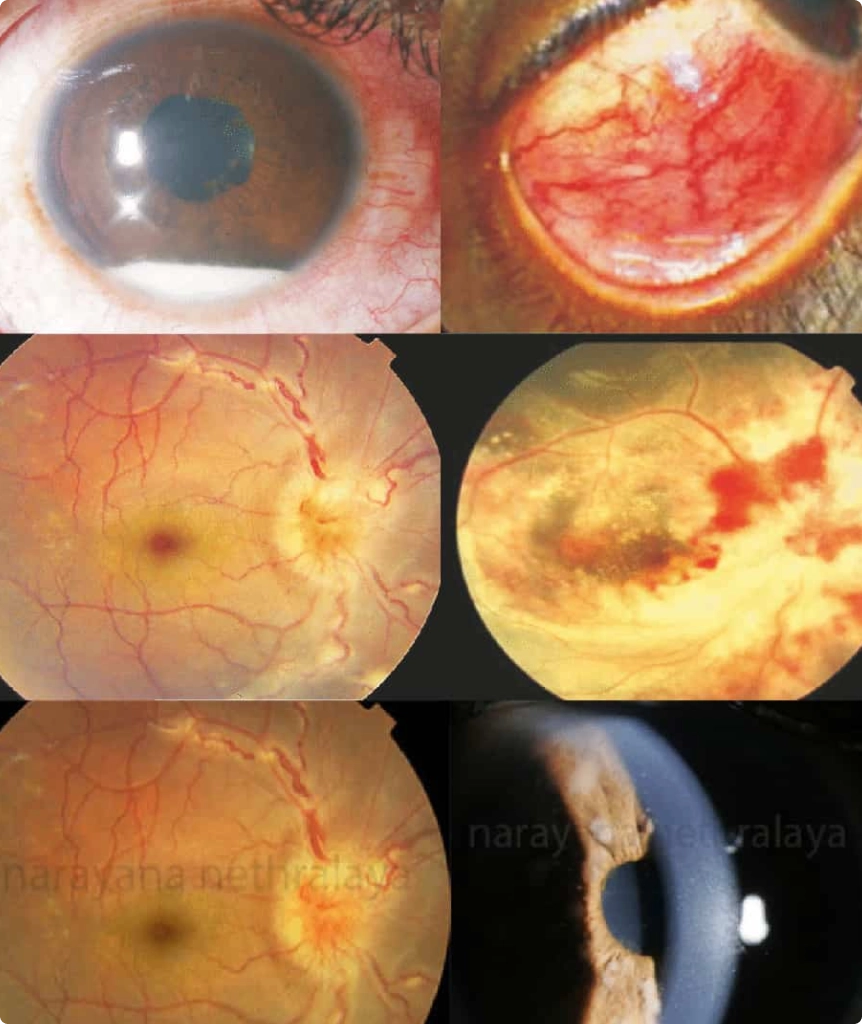
It is important to know the cause of the uveitis. Once it is identified uveitis can be treated successfully. Since most of the uveitis are due to disbalance of body’s immune system or due to certain infections in the body, work up of uveitis includes many investigations, which various scans for eye as well as body, lab tests from eye fluid or from body fluid like blood, sputum, urine etc.
Common eye investigations which can be done at the eye hospitals are: OCT scan, FFA scan to study the retina and ICG scan to study the choroidal vessels, Ultrasound scan (B scan), etc.
Eye fluid test is a procedure where a small needle goes into eye and aspirates fluid for certain lab tests to find out the cause for uveitis.
Common blood tests for uveitis are: CBC, ESR, CRP, TPHA, RBS, HIV, Mantoux, Urine test
Certain uveitis may require specific investigations which are available in selected laboratories. Eg: HLA B 27, HLA B 5 1, ANA, ANCA
Mantoux test is a skin test. After the skin test patients should not touch the injection site till the reading is over. Usually reading is taken after 48 hours.
Test which cannot be done at eye hospital are: Chest X-ray, CT scan, MRI, PET scan
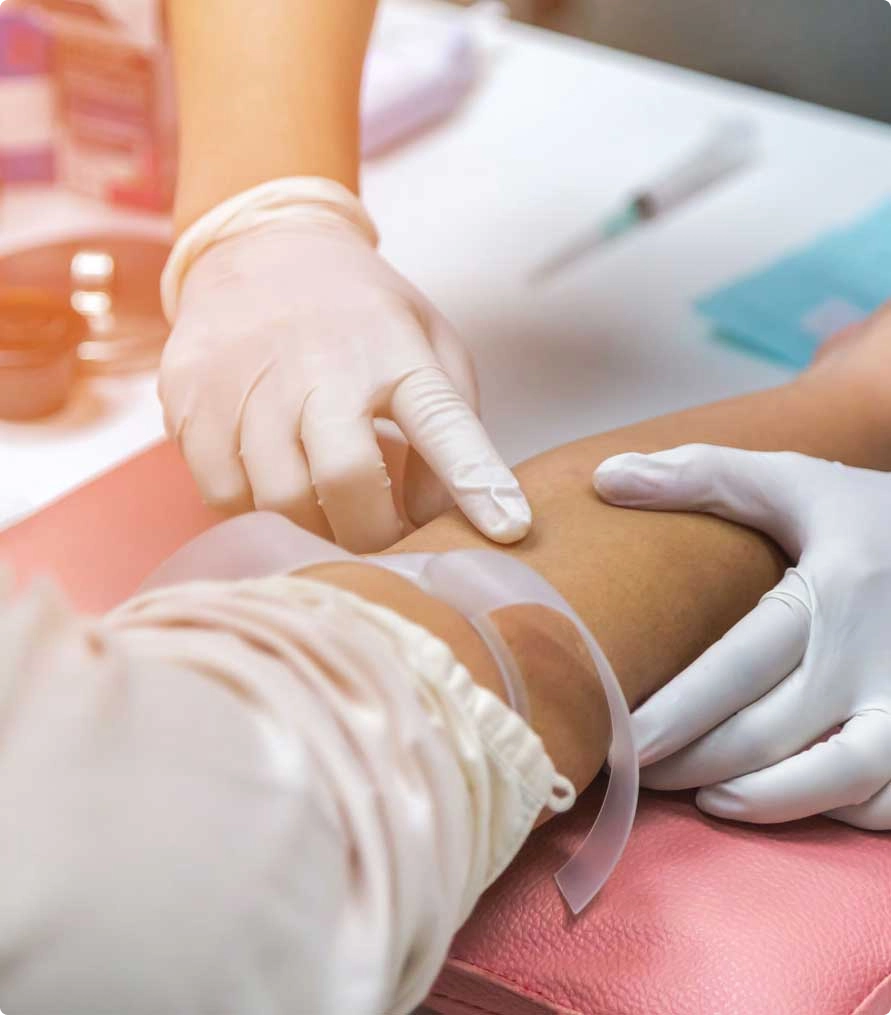
These drugs can cause, hair loss, increased liver enzymes, secondary malignancies and predisposed development of superadded infections.
If you have constant redness, pain, watering, inability to see bright light, floaters and/or decreased vision, you should schedule an appointment with an ophthalmologist to get your eyes checked immediately. Your initial consultation with the doctor will approximately take 2 hours if you do not require cross-consultation and up to 4 hours if you require cross-consultation. During your consultation, our doctors and counsellors will determine the best course of action for your visual needs, go over the risks and benefits of treatment, and help you choose the best procedure that is suitable for preserving/improving your vision. We suggest you bring a family member or friend with you to help you with your decision-making.
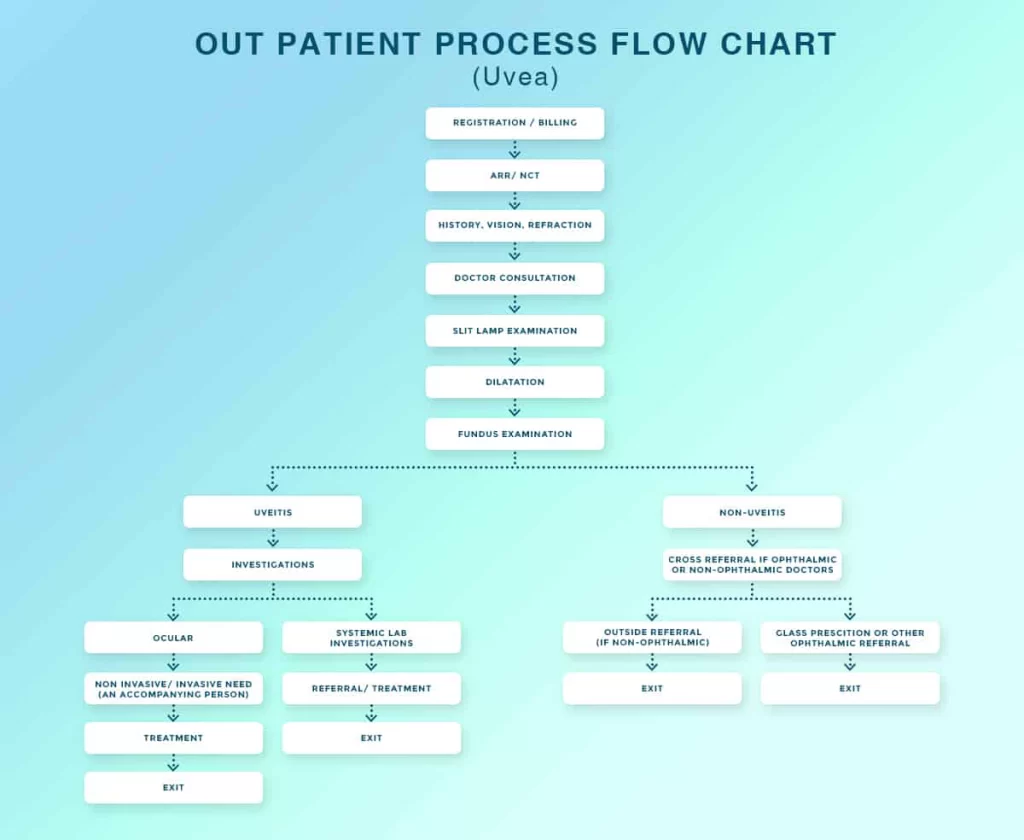
At Narayana Nethralaya, we are committed to providing our patients with advanced quality eye care at affordable prices. These eye surgery experiences stand testimony to the excellence in eye care that we offer.
Uveitis is an inflammation of the pigmented layer of the eye known as uvea comprising of iris, choroid and ciliary body.
There are various causes of uveitis. They can be classified into infectious, autoimmune, due to injury or could be due drugs.
Infectious causes could be viral like herpes virus, varicella virus; bacterial like tuberculosis; parasitic like toxoplasmosis.
Post fever immune mediated reactions can cause uveitis for example Dengue, Chikungunya, Rickettsia and Typhoid.
Treatment options could be eye drops, eye injections, oral medications or systemic medications.
Systemic medications may sometimes be administered in consultation with an pulmonologist or a rheumatologist.
They can be invasive or non-invasive. Non- invasive tests include ultrasound Bscan, optical coherence tomography, fundus photo and fundus autofluoroscence.
Invasive tests can be fundus fluorescein angiography and Indocyanine angiography.
Sometimes eye fluid is tested for organisms in specific instances.
Includes blood, urine analysis and x rays of the chest or hip bones.
Depends on the severity of disease, sometimes it may go on for few months to years.
The eye pressure can increase, you may develop cataract, swelling in the macula (sensitive layer of the eye). It is important to follow the instructions as advised by your consultant.
There may be a need to visit rheumatologist or a physician/ chest physician according to the diagnosis of your condition.
Yes, many cases have been reported to involve the ocular structures after fever/infections.
Depends on the diagnosis but mostly each patient needs a customized follow up based on the advise of your consultant.
VKH disease
A 26 year old female visited Narayana Nethralaya with the complaints of headache and sudden decrease in vision in both eyes. After detailed dilated fundus examination and relevant investigations, she was diagnosed to have Vogt- Koyanagi Harada ( VKH ) syndrome . Systemic steroids along with topical steroids were started, Subsequently she was started on systemic immunosuppressive therapy. Her vision improved to 6/6 in both eyes. After two months topical and systemic steroids were stopped. She was on systemic immunosuppressive therapy for two years. Now we have 7 years follow up and the patient is doing fine.
Retinal vasculitis
A 17 year old boy visited Narayana Nethralaya with complaints of floaters in his left eye. He was found to have retinal vasculitis. On investigations he tested positive for tuberculosis. He was treated with anti-tubercular treatment (ATT) along with oral steroids. He also underwent laser treatment to prevent chances of bleeding inside the eye. His vasculitis completely resolved after completion of 9 months ATT course. During 5 years of follow up he remained asymptomatic and enjoyed floater free vision.